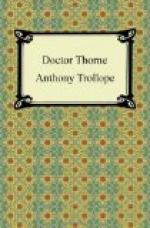The grounds about the castle were not very inviting, nor, as grounds, very extensive; though, no doubt, the entire domain was such as suited the importance of so puissant a nobleman as Earl de Courcy. What, indeed, should have been the park was divided out into various large paddocks. The surface was flat and unbroken; and though there were magnificent elm-trees standing in straight lines, like hedgerows, the timber had not that beautiful, wild, scattered look which generally gives the great charm to English scenery.
The town of Courcy—for the place claimed to rank as a town—was in many particulars like the castle. It was built of dingy-red brick—almost more brown than red—and was solid, dull-looking, ugly and comfortable. It consisted of four streets, which were formed by two roads crossing each other, making at the point of junction a centre for the town. Here stood the Red Lion; had it been called the brown lion, the nomenclature would have been more strictly correct; and here, in the old days of coaching, some life had been wont to stir itself at those house in the day and night when the Freetraders, Tallyhoes, and Royal Mails changed their horses. But now there was a railway station a mile and a half distant, and the moving life of the town of Courcy was confined to the Red Lion omnibus, which seemed to pass its entire time in going up and down between the town and the station, quite unembarrassed by any great weight of passengers.
There were, so said the Courcyites when away from Courcy, excellent shops in the place; but they were not the less accustomed, when at home among themselves, to complain to each other of the vile extortion with which they were treated by their neighbours. The ironmonger, therefore, though he loudly asserted that he could beat Bristol in the quality of his wares in one direction, and undersell Gloucester in another, bought his tea and sugar on the sly in one of those larger towns; and the grocer, on the other hand equally distrusted the pots and pans of home production. Trade, therefore, at Courcy, had not thriven since the railway opened: and, indeed, had any patient inquirer stood at the cross through one entire day, counting customers who entered the neighbouring shops, he might well have wondered that any shops in Courcy could be kept open.
And how changed has been the bustle of that once noisy inn to the present death-like silence of its green courtyard! There, a lame ostler crawls about with the hands thrust into the capacious pockets of his jacket, feeding on memory. That weary pair of omnibus jades, and three sorry posters are all that now grace those stables where horses used to be stalled in close contiguity by the dozen; where twenty grains apiece, abstracted from every feed of oats consumed during the day, would have afforded a daily quart to the lucky pilferer.




